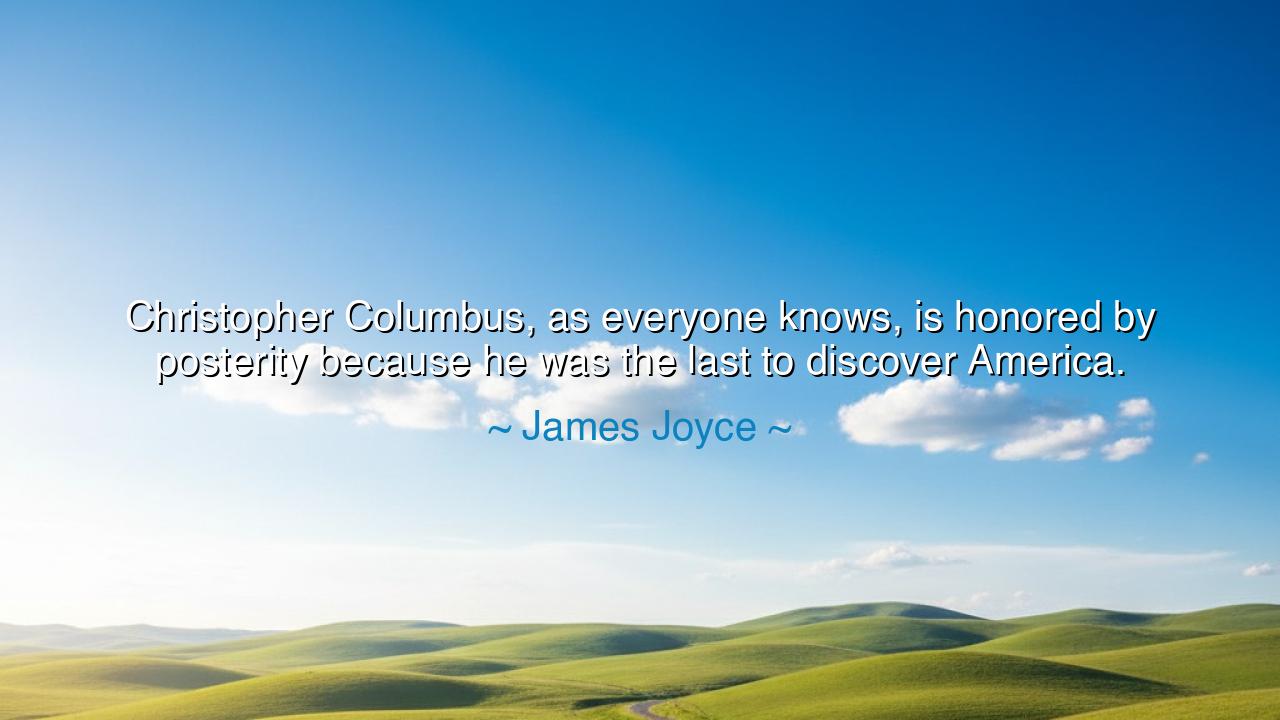
Christopher Columbus, as everyone knows, is honored by posterity
Christopher Columbus, as everyone knows, is honored by posterity because he was the last to discover America.






In the deep recesses of time, where the stories of the brave and the bold are etched in the annals of history, there are figures who, though renowned, are often misunderstood. James Joyce, with his characteristic wit, once said, "Christopher Columbus, as everyone knows, is honored by posterity because he was the last to discover America." At first glance, this statement might seem a playful paradox, for how could Columbus, celebrated as the man who "discovered" a new world, be honored for being the "last" to do so? But within this paradox lies a profound lesson about timing, recognition, and the often unseen forces that shape the path of history.
To understand this deeply, we must look back at the age of exploration and discovery, a time when the world was filled with unknown horizons, and to venture beyond the known was considered both a heroic and reckless endeavor. Columbus, driven by a dream to find a new route to the Indies, set sail across the vast, uncharted ocean. But what many overlook in their admiration for his voyage is that Columbus was not the first to set sail toward the New World. Nor was he the first to encounter its shores. The Vikings, long before Columbus, had ventured to the coasts of what is now North America, leaving traces of their presence. Yet, Columbus is the one who receives the most enduring fame. In this, Joyce’s statement speaks to the nature of history: it is not always the first who makes the most lasting impact, but the last—the one whose actions align with the moment when the world is ready to embrace change.
In the world of the ancients, the Greeks revered Heracles, not simply for his strength, but for his journey through trials that tested his character. Like Heracles, Columbus’ journey, though marred by mistakes and failures, became the legend of human perseverance, driven by the desire to accomplish the impossible. Yet, just as the gods of the Greek pantheon often favored the final and complete act—when the time was right for change—Columbus's discovery, rather than being the first, came at a time when the world was ready to receive it. Timing, like strength, is often the factor that separates the great from the unknown.
Consider the Romans, whose legacy was not solely built on their first conquests, but on their ability to adapt, expand, and make final contributions to their civilization. Julius Caesar, though not the first to lead armies, left a lasting mark because he stood at the crossroads of Roman history, influencing its final transformation. The Romans understood that being the last to achieve something—whether through the accumulation of knowledge, power, or influence—was often the key to immortality in history. Columbus, too, became immortal not because he was the first, but because his arrival on the shores of America symbolized a turning point—a moment when the world was ready for the changes he unwittingly set into motion.
This idea that the last can be more significant than the first is not confined to Columbus, nor to any one era. In the modern age, we see this truth reflected in the story of Newton and Einstein. Though Newton's work laid the foundation for modern science, it was Einstein, coming centuries later, who synthesized and expanded upon those ideas in ways that changed the course of scientific thought. Just as Newton was honored by history for his discoveries, Einstein became the man who could carry Newton's legacy forward. The essence of their contributions was not in being first, but in having the wisdom and insight to complete the work when it was ready to be finished.
The lesson we can draw from Joyce’s words and the story of Columbus is that greatness is not always about being the first to discover, but about being the one whose contributions align with the moment in history when the world is ready to receive them. Timing and readiness are often the unspoken forces that shape the world. Whether in the world of science, politics, or exploration, there is a truth: we may not always be the first to act, but sometimes it is our actions that bring forth the change when it is most needed.
So, in our own lives, let us not be disheartened by the idea that we must always be the first to arrive at an answer, a solution, or a breakthrough. The greatness lies not in being first, but in being ready, in understanding the moment when our contributions are most needed. Let us strive to be the ones who complete the puzzle, who take the final step, knowing that the last to discover may very well leave the most profound mark on the world. In this, we find that the path to greatness is not just one of firsts, but of timing, purpose, and the courage to act when the world is ready.






AAdministratorAdministrator
Welcome, honored guests. Please leave a comment, we will respond soon